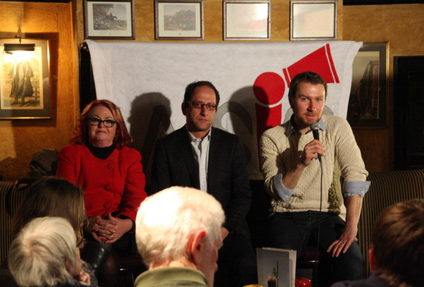
On Monday, January 20th, WSIC hosted an expert panel to engage audience members on the Canada/E.U. Comprehensive Economic and Trade Agreement (CETA). Sharing their views on the subject were Catherine Swift, Chair of the Canadian Federation of Independent Business (CFIB), Stuart Trew, trade campaigner for The Council of Canadians, and Ali Ehsassi, a lawyer specializing in international trade law. Each speaker provided their unique point of view on the decision made by the government to enter into this important trade agreement with Europe.
Catherine began by highlighting her background as the Chair of CFIB, the largest small business organization in Canada. With other 110,000 privately held companies across Canada participants, CFIB regularly polls its members for a take on any policy issue. A poll taken by CFIB on their members showed that they were supportive in principal of a trade agreement with Europe. Two-way trade will hopefully prove beneficial to both sides, along the lines of NAFTA’s success.
Stuart Trew discussed the background of The Council of Canadians, a social justice and advocacy organization born out of the free trade debate in the 1980’s. Stuart took a more cautious view of free trade agreements generally and the idea that everyone benefits from these types of arrangements needs to be questioned. The benefits of CETA are considered slim even by our government’s admissions, and a possible trade deficit created may result in lost Canadian jobs. Any GDP gains will be minimal and are hard to justify when we think of all the policy changes that need to be made to get these results. But more significantly, if Canadians cannot give input on the terms of CETA, then at the very least we should be involved in the negotiation process. Failure by the Harper government to be transparent with Canadians on this matter means that an extreme democratic deficit exists.
Ali Ehsassi is a lawyer who practiced trade law for 13 years. His view of CETA took more of a middle ground – namely, it’s still too early to pass judgment on whether our politicians have done a good job negotiating the terms of CETA given the limited transparency we’ve had in the negotiation process. However, we need to bear in mind that Canada is a country that’s heavily dependent on trade and it’s absolutely critical we secure markets abroad to maintain our position in the world economy. On a macro level, we need to agree that Canada has no option but to subscribe to a rules-based system. So in principle, CETA may not be a bad thing, but we draw any conclusions just yet.
Asked whether they felt trade negotiators were betraying the country by offering concessions to Europe without the knowledge or necessary support of Canadians, Catherine reminded us that Canada’s experience with trade agreements thus far has been positive and she has a lot of confidence in Canadian businesses and their ability to do well as a country with these agreements in place. Ali agreed that Canadian companies are very innovative. While the Canadian dairy industry is displeased with CETA, Ali firmly believes that our high quality of cheese product will result in more cheese imported to Europe.
On the topic of cheese, audience members wanted to know whether European cheese imports would hurt Canadian businesses in Ontario and Quebec. Stuart responded that he’s seen statements from the dairy farmers estimating hundreds of millions of dollars in lost revenue as a result. The quota of European cheeses allowed to enter the Canadian market is doubling. And while Canada is giving farmers’ access to European markets, they point out that agriculture is heavily subsidized in Europe, so there is no level playing field. What may seem like an opportunity is actually more of a false promise.
Finally, and on a lighter note, one audience member wanted to know which free trade argument frustrated the panellists the most for being just plain factually wrong (regardless of their position on free trade generally). Stuart’s response was the argument that free trade creates new jobs. It is this argument that gets people the most excited yet is far from true. Catherine gets frustrated when people take a strong position on the subject of free trade, based on an emotional reaction, without having done the proper research beforehand or without the education to support their view. Ali felt that people were misled into thinking that once a free trade agreement is put in place it undermines the government’s ability to introduce environmental regulations or labour regulations in the future. This is inaccurate.
It was clear from the evening that WSIC audience members have strong views on CETA and not everyone shares the same feelings on whether its introduction will benefit Canadians as a whole. Canada and Europe still have many details left to agree on CETA, but the key principles of a trade agreement have been reached. Time will tell if we are better off as a result. All agree, whether we support free trade in principal or not, Canadians deserve transparency on this issue.
– By Roxanne

